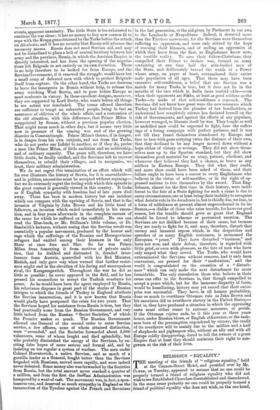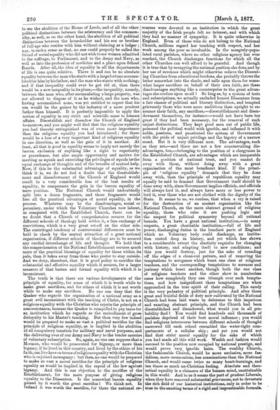at the Cannon-Street Hotel, and presided over by Mr. alty,
as well, as on the other hand, the abolition of all political distinctions between the householder and hie son or brother of full age who resides with him without claiming as a lodger; nay, in such a sense as that, no one could properly be called the friend of social equality who did not wish to see women admitted to the suffrage, to Parliament, and to the Army and Navy, as well as into the profession of medicine and a place upon School Boards. After all, the idea of equality in all the departments of life is one quite relative. There is and can be no absolute equality between the man who starts with a large fortune accumu- lated for him by his father, and the man who starts with nothing; and if that inequality could ever be got rid of, then there would be a new inequality in its place,--the inequality, namely, between the man who, after accumulating a large property, was not allowed to dispose of it as he wished, and the man who, having accumulated none, was yet entitled to expect that his sou would be the gainer by the industry of a more prudent father than himself. It is perfectly impossible to apply the notion of equality in any strict and scientific sense to human affairs. Disestablish and disendow the Church of England to-morrow, and you might well find that the religious equality you had thereby extinguished was of even more importance than the religious equality you had introduced ; for there would be a loss of a very important kind of religious equality in one direction, as well as the gain of it in another. At least, all that is good in equality seems to imply not merely the barren exclusion of anything like a right to superiority or precedence, but also ample opportunity and motive for meeting as equals and exercising the privileges of equals hrthe equal exchange of thoughts and of the benefits of mutual help. Now, if this be the substantial advantage of equality, as we think it is, we do not feel a doubt that the disestablish- ment and disendowment of the Church of England would result in a very considerable loss of the best results of equality, to compensate the gain in the barren equality of mere position. The National Church would undoubtedly split into a dozen fragments, and these fragments would lose all the practical advantages of moral equality, in the process. Whatever may be the disadvantages, social or pecuniary, under which the Voluntary Churches now labour, as compared with the Established Church, there can be no doubt that a Church of comprehension secures for the different schools of theology held within it, a free exchange of convictions, which is a very great set-off on the other side. The centrifugal tendency of controversial differences must be held in check by the central attraction of a great national organisation, if different schools of theology are to be secured any cordial interchange of life and thought. We hold that the comprehension of the National Establishment secures much more of the practical blessings of equality for those within its pale, than it takes away from those who prefer to stay outside. And we deny, therefore, that it is good policy to sacrifice the substantial and effective equality which it secures, for a larger measure of that barren and formal equality with which it is inconsistent.
The truth is that there are various developments of the principle of equality, for some of which it is worth while to make great sacrifices, and for others of which it is not worth while to make any sacrifices. No one can deny that the Quaker who regards the organisation of a national army as a great evil inconsistent with the teaching of Christ, is not on a religious equality with the Christian who rejects the principle of non-resistance, because the Quaker is compelled to pay taxes for an institution which he regards as the embodiment of gross disloyalty to his Master's teaching. But then very few indeed would be prepared to make so vast a political sacrifice for the principle of religious equality, as is implied in the abolition of all compulsory taxation for military and naval purposes, and the delivering over of our Army and Navy to the tender mercies of voluntary subscription. So, again, no one can suppose that .a Mormon, who would be prosecuted for bigamy, or more than bigamy, if he lived in this country, and lived by the ethics of his faith, can live here on terms of religious equality with the Christian who is enjoined monogamy ; but then, no one would be prepared to make so vast a moral sacrifice for the principle of religious equality as would be implied in the repeal of the law against bigamy. And this is our objection to the sacrifice of the Establishment, for the mere purpose of giving religious equality to the Dissenters. Is the somewhat barren equality gained by it worth the great sacrifice? We think not. In Ireland it was worth the sacrifice, for there the national re- sources were devoted to an institution in which the great majority of the Irish people felt no interest, and with which they had no manner of sympathy. It is quite otherwise in England. Even of those who do not belong to the National Church, millions regard her teaching with respect, and her work among the poor as invaluable. In the meagrely-popu- lated rural parishes, where no other religious agency has ever reached, the Church discharges functions for which all the other Churches can well afford to be grateful. And though it is true that by occupying the national position she does, and by her use of revenues which might otherwise relieve the Dissent- ing Churches from educational burdens, she probably throws the latter somewhat into the shade, and calls upon them for some- what larger sacrifices on behalf of their own faith, are these disadvantages anything like a counterpoise to the great advan- tages she confers upon us all ? So long as, by a system of tests and subscriptions, we actually excluded honest Dissenters from a fair chance of political and literary distinction, and tempted grievously those who were more ambitious than upright to re- nounce their faith, any sacrifices,--disestablishment and disen- dowinant themselves, for instance—would not have been too great if they had been necessary, for the removal of such unjust distinctions. They kept good men out of public life, poisoned the political world with ignoble, and inflamed it with noble, passions, and penetrated the system of Government with the pride of unjust privilege and the bigotry of a narrow creed. But it is very different now. The advantages, such as they are,—and there are not a few countervailing dis- advantages, too,—belonging to the position of a clergyman in the Established Church, are advantages which are inseparable from a position of national trust, and you cannot do away with them, without doing away with a great organisation of the most beneficent kind. If the princi- ple of 'religious equality' dema,nds that they be done away with, then the principle of republican equality may equally be said to demand that Government itself should be done away with, since Government implies officials, and officials will always lord it, and always have more or less power to lord it, over those who are not clothed with the dignity of the State. It seems to us, we confess, that when a cry is raised for the destruction of an ancient organisation like the National Church, on the mere abstract ground of religions equality, those who raise it are pushing logic and the respect for political symmetry beyond all rational bounds. You have a great national institution,—in many respects, a great charitable institution,—full of life and power, discharging duties in the loneliest parts of England which no Voluntary body could discharge, an institu- tion rooted deep in history, and yet which has shown to a considerable extent the elasticity requisite for changing with history, and adapting itself to new conditions; and this you would destroy, just for the sake of rounding off the edges of a clean-cut pattern, and of removing the temptations to arrogance which beset one class of religious teachers, and the corresponding temptations to soreness and jealousy which beset another, though both the one class of religious teachers and the other show in numberless cases how completely they can triumph over such tempta- tions, and how insignificant these temptations are when approached in the true spirit of their calling. This surely is the very pedantry of political principle. And after those great and fruitful fields of duty now cultivated by the National Church had been laid waste in deference to this imperious and exacting abstract principle, and the Church had been disestablished and disendowed, what would you in all pro- bability find ? You would find hundreds and thousands of parishes deprived of their best moral influence ; you would find religious intercourse between different schools of thought narrowed till each school resembled the water-tight com- partments of a cellular ship ; and yet you would not find that strict moral equality for the sake of which you had made all this wild work. Wealth and fashion would succeed to the position now occupied by national prestige, and would prove very. ignoble heirs. The wealthy Church, the fashionable Church, would be more exclusive, more fas- tidious, more ceremonious, less conscientious than the National Church., and would cause twice as many heart-burnings, and ten times as much un-Christian foaling. Absolute and theo- retical equality is a chimaira of the barman mind, unattainable in•thisworld. And to us it seems the part of prudent Liberals, when they have removed substantial grievances, not to devastate the rich field of our historical institutions, only in order to be true. to the emoting terms of a rigid and impracticable formula.



































 Previous page
Previous page